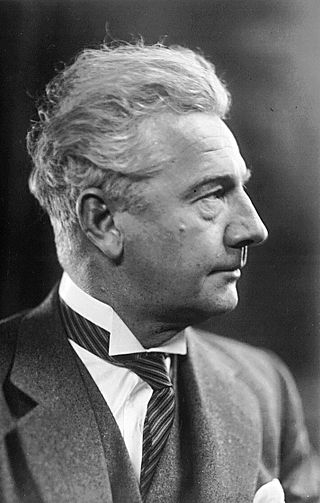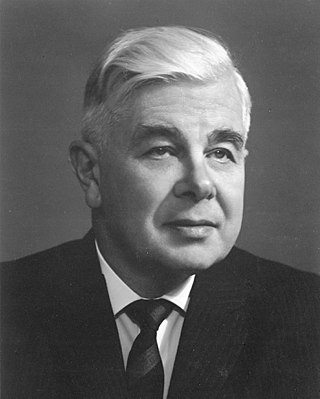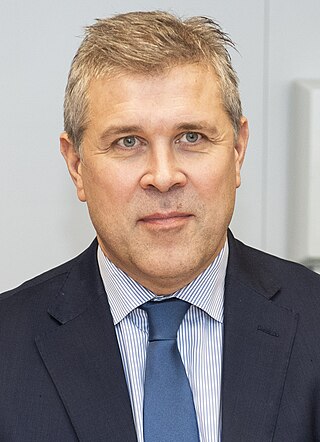
The politics of Iceland take place in the framework of a parliamentary representative democratic republic, whereby the president is the head of state, while the prime minister of Iceland serves as the head of government in a multi-party system. Executive power is exercised by the government. Legislative power is vested in both the government and the parliament, the Althingi. The judiciary is independent of the executive and the legislature.

The Independence Party is a conservative political party in Iceland. It is current the second largest party in the Alþingi, with 14 seats. The chairman of the party is Bjarni Benediktsson and the vice chairman of the party is Þórdís Kolbrún R. Gylfadóttir.

Ólafur Tryggvason Thors was an Icelandic politician of the Independence Party, who served six times as prime minister of Iceland.

Bjarni Benediktsson was an Icelandic politician of the Independence Party who served as prime minister of Iceland from 1963 to 1970. His father, Benedikt Sveinsson (1877–1954), was a leader in the independence movement in Iceland and a member of the Althingi from 1908 to 1931.

Jóhann Hafstein was elected to the Althingi for Reykjavík in 1946, which he represented until 1978, when he resigned due to ill health. Jóhann served as prime minister of Iceland from 10 July 1970 to 14 July 1971, for the Independence Party, following the tragic death of prime minister Bjarni Benediktsson. Hafstein also become the chairman for the Independence Party immediately. Hafstein's cabinet was replaced and defeated in the 1971 parliamentary election, causing him to step down as prime minister. Hafstein stepped down as party leader in 1973 following health problems. He died on 15 May 1980 due to a long illness that had previously caused him to resign two years earlier.

The Icelandic Ministry of Finance is responsible for overseeing the finances of the Icelandic government. The Minister for Finance and Economic Affairs is Daði Már Kristófersson.

Bjarni Benediktsson, known colloquially as Bjarni Ben, is an Icelandic politician who served as the prime minister of Iceland from January to November 2017 and again from April to December 2024. He has been the leader of the Icelandic Independence Party since 2009, and served as the minister of finance and economic affairs from 2013 to 2017, a post he later retained under Katrín Jakobsdóttir and held until his resignation in October 2023. After serving briefly as the minister for foreign affairs from 2023 to 2024, Bjarni became prime minister again on 9 April 2024.

Svandís Svavarsdóttir is an Icelandic politician who has been member of the Althing since 2009. In October 2024, she was elected party leader of the Left-Green Movement. She served as Minister for the Environment and Natural Resources in the government of Jóhanna Sigurðardóttir. In the First cabinet of Katrín Jakobsdóttir she served as Minister of Health. She was also the leader of the Left-Green Movement's parliamentary group. She served as the Minister of Fisheries and Agriculture in the Second cabinet of Katrín Jakobsdóttir before Bjarni Benediktsson became Prime Minister, and she became Minister of Infrastructure.

Parliamentary elections were held in Iceland on 27 April 2013. Fifteen parties contested the elections, compared to just seven in the previous elections. The result was a victory for the two centre-right opposition parties, the Independence Party and Progressive Party, which subsequently formed a coalition government. The parties were eurosceptic and their win brought to a halt partially completed negotiations with the European Union regarding Icelandic membership.

Sigurður Ingi Jóhannsson is an Icelandic politician, who was the prime minister of Iceland from April 2016 to January 2017. He has been the chairman of the Progressive Party since 2016 and Minister of Finance and Economic Affairs between April and December 2024, having previously served as Minister of Infrastructure.
The Cabinet of Bjarni Benediktsson in Iceland was formed 14 November 1963. It dissolved 10 July 1970 due to the death of the Prime Minister, Bjarni Benediktsson, who was killed in a house fire the night before along with his wife and grandson.

The Fifth cabinet of Ólafur Thors in Iceland was formed 20 November 1959.
Parliamentary elections were held in Iceland on 29 October 2016. They were due to be held on or before 27 April 2017, but following the 2016 Icelandic anti-government protests, the ruling coalition announced that early elections would be held "in autumn".

Bjarkey Olsen Gunnarsdóttir is an Icelandic politician and lawmaker. She served as Minister of Food, Fisheries and Agriculture from April to October 2024 and has been member of the Althing since 2013, representing the North East.
Bjarni Benediktsson may refer to:

Early parliamentary elections were held in Iceland on 28 October 2017. On 15 September 2017, the three-party coalition government collapsed after the departure of Bright Future over a scandal involving Prime Minister Bjarni Benediktsson's father writing a letter recommending a convicted child sex offender have his "honour restored". Bjarni subsequently called for a snap election, which was officially scheduled for 28 October 2017 following the dissolution of the Althing.

Parliamentary elections were held in Iceland on 25 September 2021 to elect the members of the Althing. Following the elections, the three parties in the ruling coalition government – the Independence Party, Progressive Party and Left-Green Movement – agreed to continue in office, with Katrín Jakobsdóttir of the Left-Green Movement remaining Prime Minister despite her party being the smallest of the three. It was the first time an incumbent government had retained power in an election since the 2008 financial crisis.

Þórdís Kolbrún Reykfjörð Gylfadóttir is an Icelandic lawyer and politician of the Independence Party. She most recently served as the minister of foreign affairs in 2024, having previously held the portfolio from 2021 to 2023. She also served as finance minister from 2023 to 2024 and tourism and industry minister from 2017 to 2021.

Parliamentary elections were held in Iceland on 30 November 2024 to elect the 63 members of the Althing. The centre-left Social Democratic Alliance, led by Kristrún Frostadóttir, outperformed the ruling Independence Party to win the most seats, at 15. The election saw the worst performance by the Independence Party, Progressive Party, the Left-Green Movement, and the Pirate Party in each of the parties' histories, while Viðreisn, the People's Party, and the Centre Party saw their best performance in each of the parties' histories. This follows a trend of Icelanders voting against every post–2008 recession government except during the 2021 election.

The Second cabinet of Bjarni Benediktsson was formed on 9 April 2024, following the resignation of Katrín Jakobsdóttir to run in the presidential election. The cabinet was led by Bjarni Benediktsson of the Independence Party, who previously served as Prime Minister of Iceland in 2017.















